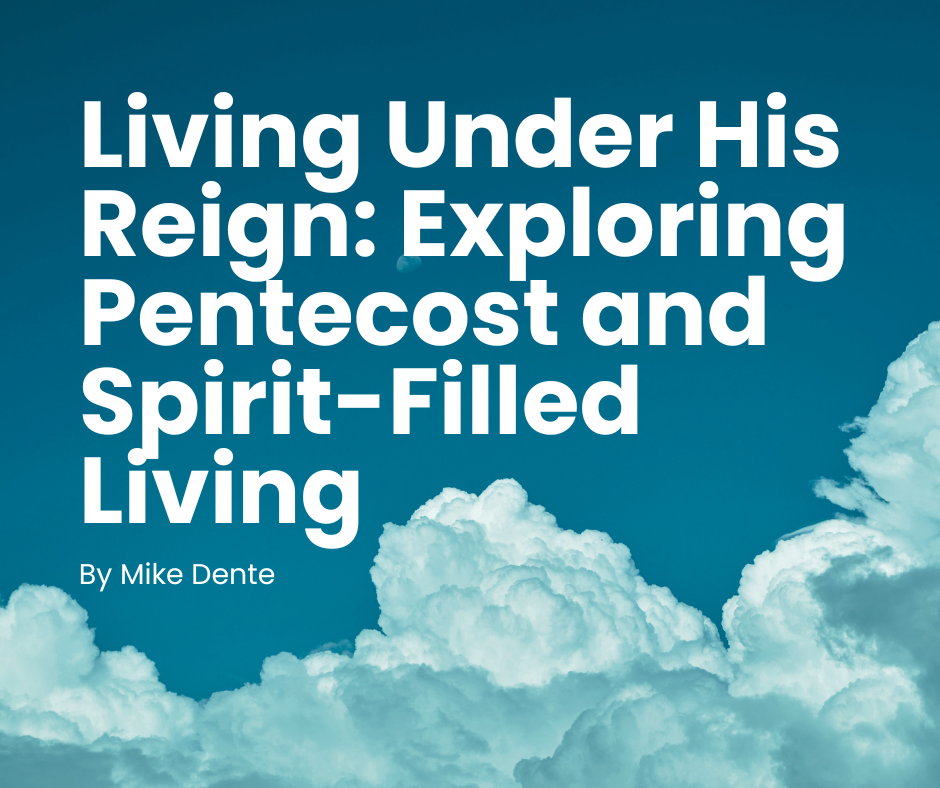
Editor’s Note: This year, Pentecost falls on May 19th, which is seven weeks after Easter Sunday.
What does it mean to be Spirit-filled? There are so many variations and mental pictures in books or sermons that it needs to be clarified. I’ve known of the Jedi model, someone so in tuned with the Spirit that they float from place to place as the Spirit gives utterance, ready to cast down any spiritual attack with the lightsaber of prayer. Holding a job with this model or consistently leading a local church is hard. What about the holiness version? The Spirit-led believer who’s always angry at sin is wholly cut off from the world around them lest they find themselves contaminated or, worse yet, calling into question their faith because they saw a TikTok that provoked doubt. I don’t think an article on a blog will give the definitive answer, but I believe we have an example in a holiday coming up that may provide us with some fuel for thinking through the question. Let’s look at Pentecost.
Pentecost Celebrated
As we remember in Leviticus 23, Pentecost is one of the Feasts of the Lord; the Hebrew name “Shavuot” means weeks, for the weeks counted, or for the fifty days until the feast of Pentecost. In contemporary Judaism, it’s celebrated by commemorating the reception of the Law on Mount Sinai. In synagogues, they read the Ten Commandments. Some also read Ruth. It’s common for more traditional families to stay up the first night, read the Torah, and pray the Tsikor, the prayers of remembrance for the disappeared.
Pentecost Sunday is not widely celebrated in Calvary Chapels, though we remember it as the Church’s birth and the Kingdom’s growth on earth. It’s a day that means a great deal to us, and like most continuationists,[1] we like to believe that we celebrate Pentecost every day, especially on Sundays or in afterglows. For those of us who give time to wait on the Lord to allow the gifts to be practiced biblically, that’s the way we like to celebrate Pentecost. How many of us have experienced prophetic prayer and received healing, vision, a word, or comfort as the believers gathered to wait on the Lord? It’s one of our distinctives as a Church movement that I enjoy most, and I find myself in deep need of this.
Peter Proclaims Jesus the Messiah in Jerusalem
I want to pull out another aspect of Pentecost because it’s also vitally important. When Peter spoke up and preached in Jerusalem in Acts 2, he proclaimed Jesus the Messiah, Jesus the Lord. The way he makes his point at the end of his proclamation shows that the signs they were exhibiting confirmed this point. I like the way Darrell Bock puts it:
“Peter’s point is not that Jesus will have this throne one day sometime far in the future. In other words, the point is not that Jesus is merely appointed for the Davidic role now and qualifies for it through his resurrection and then will exercise this authority in the future, in the same way the anointing of David long preceded his actual functioning as king. Rather, Peter’s point is that the exercise of messianic authority is on display now in the Spirit’s present distribution.”[2]
The speaking in tongues, the Holy Spirit-inspired sermon shouted in Jerusalem’s streets, heralded the Good News’s announcement. Jesus is the Resurrected Lord (Acts 2:24), anointed King in the line of David, sitting at the righthand of the Father, pouring out the Holy Spirit (Acts 2:32-36), and beginning His reign through His people (Acts 2:38-39). It’s not just a future reign (Acts 1:8). It’s the Promise of the Father (Luke 24:44-48).
The link between the Kingdom language in Peter’s Gospel presentation and the Gifts of the Spirit on display is often overlooked. One or the other seems emphasized, even when a teacher goes verse by verse. This usually follows the application the pastor wishes to make. We can all agree that given the enormity of the passage and all it has said to the Church for the past 2000 years, it still speaks today, and I doubt we’ve mined every lesson possible out of the text. We may have to wait to hear it from Peter himself, but thankfully, the Holy Spirit speaks through biblical scholars, pastors, teachers, and Christians everywhere.
In verses 14-21, Peter explains the speaking in tongues by referencing the prophet Joel’s apocalyptic vision of the pouring out of the Holy Spirit on all people in the last times. Peter quotes the passage all the way up to, “And it shall be that everyone who calls upon the name of the Lord will be saved.” In writing Acts, Luke is quoting the Greek translation (LXX) to his Greek-speaking readership; if we take it back to the Hebrew text, which says pretty much the same thing, it should be noted that the term for Lord is YHWH. This becomes all the more powerful in verse 36 as Peter concludes God has made Jesus, Lord and Christ (Messiah). His whole message leads to this point.
Another fun fact in the story, going back to Joel and reading it forward into the text in Acts, is found by reviewing the part of the verse Peter didn’t quote: Joel 2:32b “For in Mount Zion and Jerusalem there shall be those who escape, as the LORD has said, and among the survivors shall be those whom the LORD calls.” The word for “survivors” in Hebrew (śᵉrı̂ḏim) was translated in the LXX into a different word—to evangelize (euaggelizomenoi). This is another example of how this passage is massively profound, needing careful exegesis and thoughtful commenting.
Following the Spirit, Obeying the King
What if we were to say that Pentecost isn’t just the day the Church explodes on the scene of history in flaming power and with signs from the Holy Spirit but that it’s also a clear proclamation of the Lordship and Messiahship of Jesus, which was confirmed by these signs? What does this mean for us continuationists? It means that following the Spirit is to live under the reign of the Lord. It doesn’t mean to follow some vague inclining in a person’s heart. It can’t mean to follow one’s desires. It means obedience to One King.
I believe this is especially important if we consider some of the things we’ve been told growing up, messages we’ve been given through movies, messages that go back to writers that philosophers inspired with radically different worldviews than our own. Messages like follow your heart, be authentic, and trust your instincts sound so close to what one might imagine as living a Spirit-filled existence that the lines of communication can become confused. This can lead to acts of obstination, quarreling for evangelism, and the types of disorders in life and the Church described in 1 Corinthians. The reality is if we are filled with a spirit that leads us into behavior that isn’t reflective of the Gospel, we aren’t fully obeying our King. Perhaps in part, but not in heart.
However, if we live under our King’s reign, we’ll allow His Spirit to lead us. This may not begin with the big questions of where to go or what to do before it redirects our worship like tongues of fire and sweet, profound times of prayer in His presence. It’ll most likely lead us to examine our motivations and hopefully reveal points in our lives where we’ve been led more by unbelief than vibrant trust. It’s a wild ride, to say the least! But I wonder how it would affect our witness in this world if, having begun in the Spirit, we continue and advance in Him as He gives us strength.
Footnotes
[1] The belief that the gifts of the Spirit are for today.
[2] Darrell L. Bock, Acts (Baker Exegetical Commentary on the New Testament) (Grand Rapids, MI: Baker Publishing Group, 2007), Kindle Edition.







